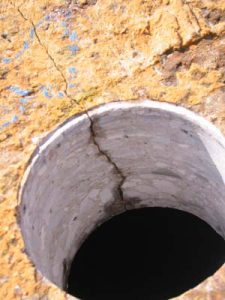 Cracked concrete, brickwork and masonry can be repaired by injection of polyester or epoxy based resins, or in the case of wider cracks, using cementitious grouts. Leaking cracks can be sealed using polyurethane resin based grouts.
Cracked concrete, brickwork and masonry can be repaired by injection of polyester or epoxy based resins, or in the case of wider cracks, using cementitious grouts. Leaking cracks can be sealed using polyurethane resin based grouts.
Ram Services use a wide variety of materials for crack injection, including
- ultra low viscosity resins for narrow cracks down to 0.2mm in width.
- thixotropic materials for wider cracks where exposed crack faces cannot be surface sealed prior to injection,
- micro fine cement grouts and
- more cohesive pastes or mortars for wider cracks.
Such work is often undertaken in conjunction with other treatments, including concrete repairs, application of waterproof finishes, installation of stitch ties or anchors, or brick and masonry replacement.
 Crack injection Information
Crack injection Information
Where cracks are associated with seepage of water, either from within a water retaining structure, or perhaps from the ground, crack injection involves different techniques and materials to both seal the crack and stem the water penetration – see pages on leak sealing.
Crack injection is only successful where cracks are static, ie not subject to movement as a result of thermal changes or dynamic loading, and generally where cracks are clean and dry.
In these circumstances, infilling of cracks can restore structural integrity by filling the crack void and returning the cracked section to a more monolithic state.
Examples of Past Work
Sealing cracks in wall of A1(M) Hatfield tunnel for Highways Agency.
Sealing cracks in roof of Davyhulme WwTW sewage digester to prevent escape of gas for United Utilities Water.
